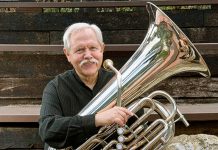
— Photo courtesy Sage Hill School ©
As the year heads into 2020, Sage Hill School in Newport Coast is celebrating two decades of inspiring students.
“It’s 20 years young,” said Head of School Patricia Merz, who has been part of the Sage faculty for 13 years and was appointed to her current position in 2014.
Gordon McNeill first joined Sage Hill in the early years of the administration as Dean of School Life in 2001, he was appointed Head of School in 2008, and named president in 2014.
“I thought that would be a lot of fun, to be at a new organization with such a broad impact,” McNeill said.
How the school started is unique, Merz pointed out.
There have been three key phases over the past two decades, Merz pointed out.
The visionaries kicked off the first chapter of Sage Hill’s story, imaging what the school could be and helping it become a reality.
They then handed the baton over to the builders. They focused on growth, developing programs and expanding access, Merz explained. It was very intentional, she noted.
Next, and the current stage for Sage, it’s in the hands of the futurists, Merz commented, the people who recognize the school has solidified its place in the community and are looking toward the next step.
There were also some “sustainers” also in the mix along the way, she added.
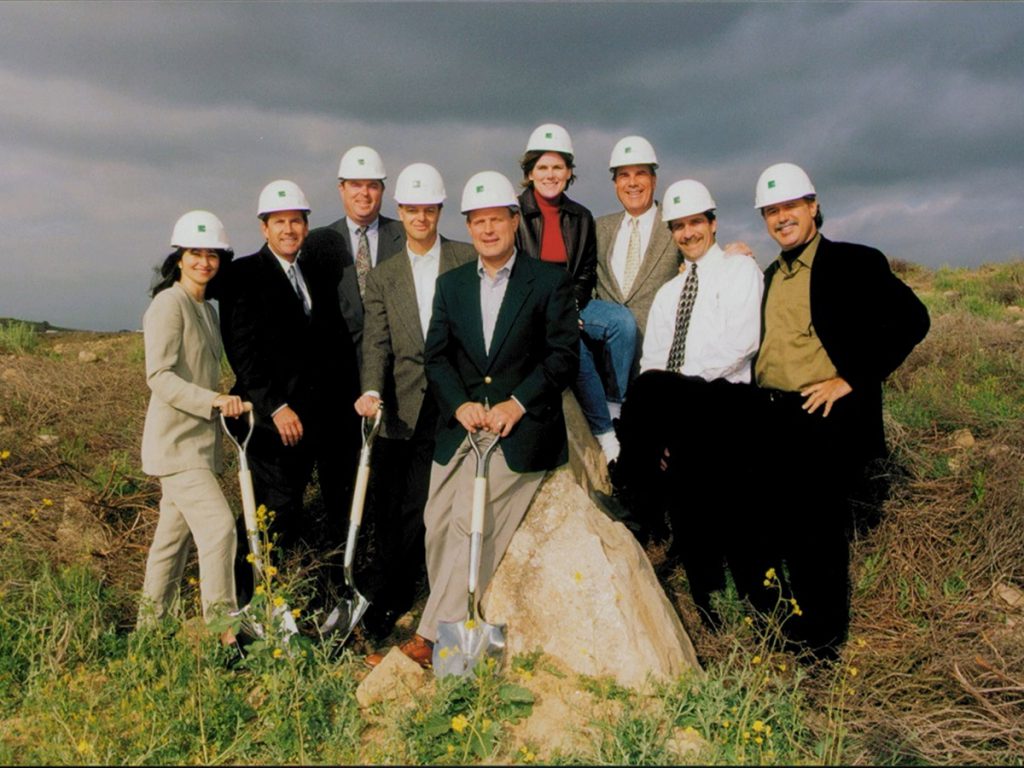
— Photo courtesy Sage Hill School ©
Sage Hill School originated as the vision of a small group of dedicated parents that came together in the mid-1990s to build a non-denominational, independent high school in Orange County.
In 1998, after considering multiple locations around Orange County, the founders secured the 28-acre parcel on Newport Coast Drive as the future home of the school. The land was a coastal sage environment, thus inspiring the name Sage Hill School.
The school was built on 10 core values: Courage, balance, community, service, discovery, knowledge, excellence, integrity, compassion, and creativity.
They had clear and defined mission and values, Merz noted.
“They weren’t subtle,” she joked. “The school has stayed true to that mission and has continued to grow.”
The mission and values of what they originally set in place are still “very much alive and well today,” McNeill said.
“We had an opportunity to really dive in and talk about the culture we wanted at the school,” McNeill said. “We wanted to give students a lot of ownership of their day and their (educational) journey.”
Their intention was to develop a school that would inspire innovative thinking, nurture creative thought and embrace diversity.
Graduates should have a level of knowledge and understanding of certain subjects, but should also be prepared to go off to a college or right out into another aspect of life, McNeill commented.
Those early conversations of shaping the school are some of her strongest memories, founding faculty member Merja “Mer” Connolly noted.
“What do we want the picture of our graduate to be like?” Connolly said. “We spent hours and hours on that conversation.”
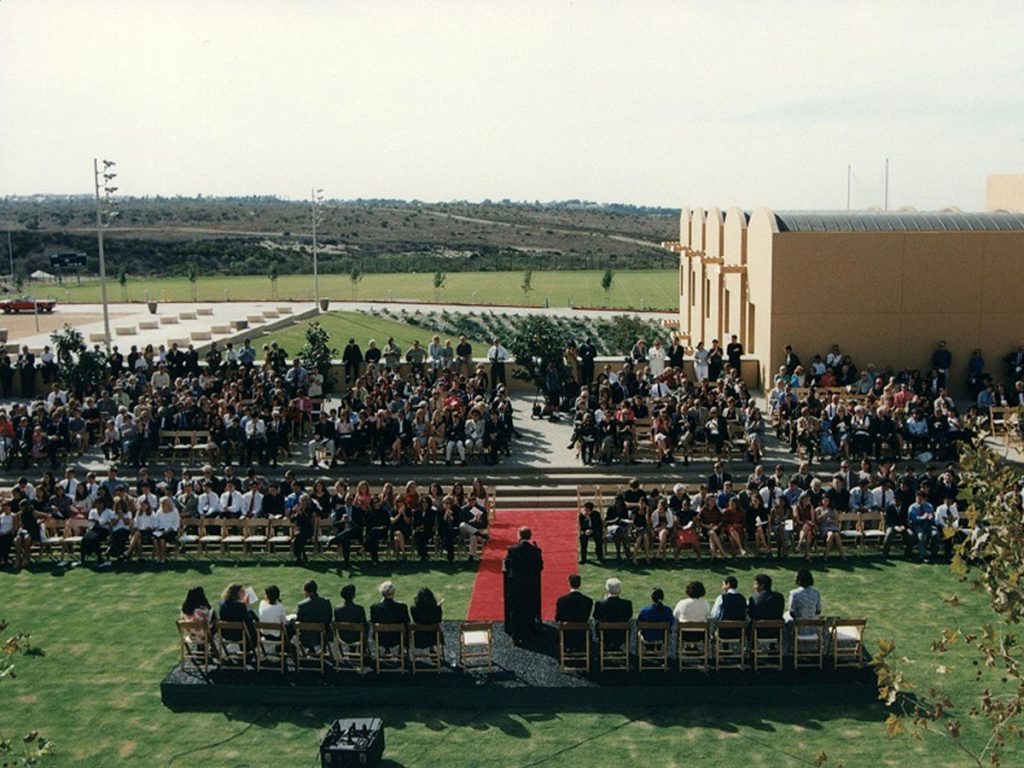
— Photo courtesy Sage Hill School ©
Connolly explained the early process included building backward from the “banner values” they want each graduate to possess, then breaking down into departments and evaluating the curriculum to ensure they are moving toward those values.
Sage Hill School opened on Sept. 7, 2000 with approximately 90 ninth grade students, 30 10th grade students, and 12 full-time faculty. In the first three years, the school added grades 11 and 12, school enrollment expanded to nearly 400 students and teaching faculty tripled in size.
“It was super exciting to see us grow from that first year,” Connolly said. “It’s been incredible to be part of starting a school.”
Connolly, Sage’s current wellness director, said she was looking for more balance when others reached out to her about starting an athletic program at the soon-to-be Sage Hill School.
She was hired on as the assistant athletic director the summer before school began. They were meeting in an office on Jamboree Road, since there was no campus yet.
They brainstormed and came up with more than a dozen different sports, nearly as many as they still have today. Coaches were hired and equipment was ordered, Connolly recalled.
“We had an incredible first year,” she said.
They didn’t belong to any official athletic conference or league, but they scheduled as best they could, she explained. They had one team per sport, since the school consisted of only freshmen and sophomores.
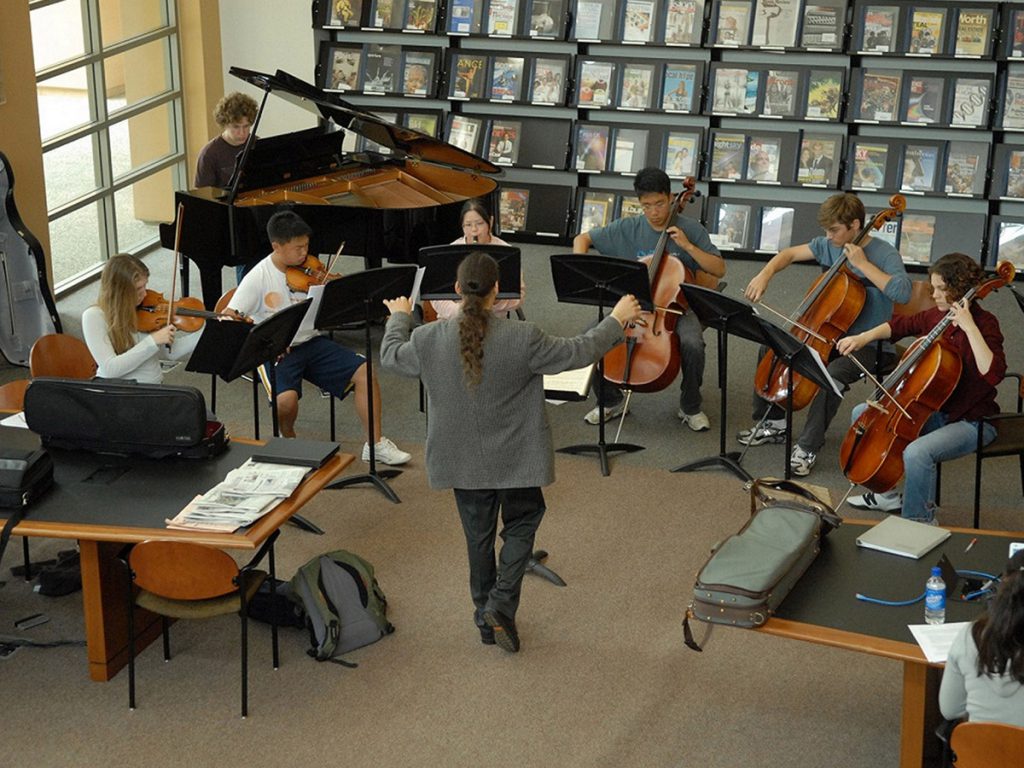
— Photo courtesy Sage Hill School ©
Some of the first structures on the campus included the library, humanities building, and gym. The town square was constructed specifically as a gathering place.
In the first year, the entire school would gather in a room in the humanities building for the weekly “town meetings,” a tradition that continues today, but was moved into the library and ultimately the Town Square as enrollment grew over the years.
Dance concerts were where math class is held now, Connolly added.
“We were really creative with what we did,” she said.
The first graduating class from Sage Hill School donned their caps and gowns in June 2003.
The first several years, as the school grew, they made realizations and evolved accordingly, Connolly said.
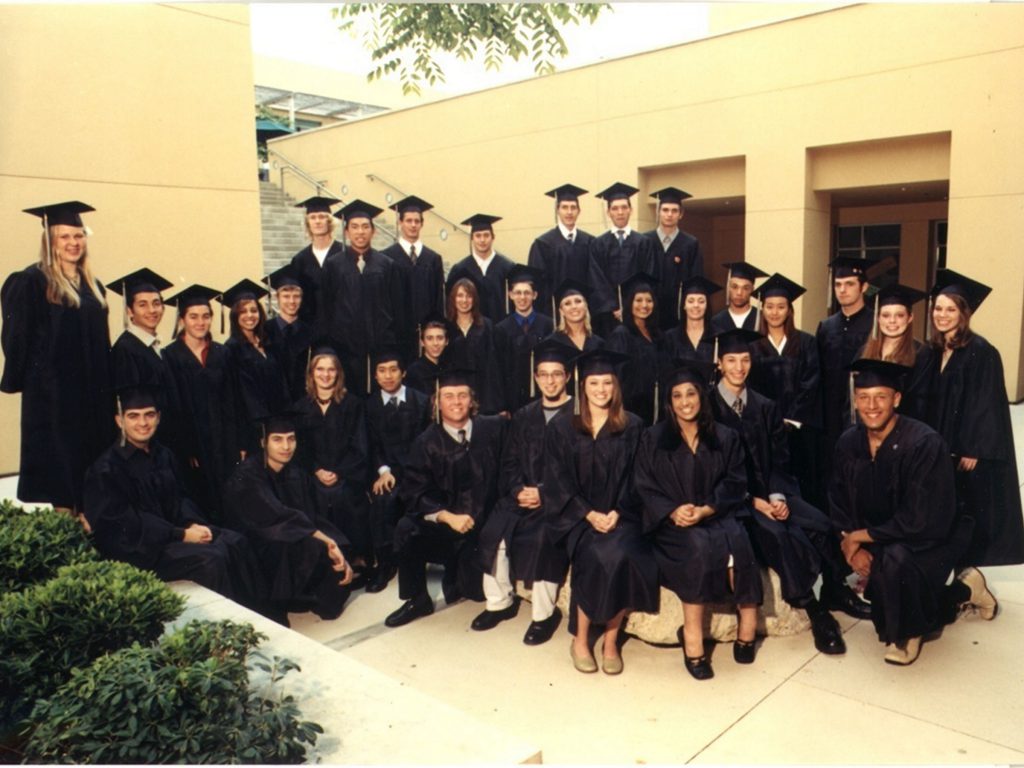
— Photo courtesy Sage Hill School ©
There was a learning curve, McNeill noted. Clubs, for example, are student run, but they learned that there also needs to be an attached staff member to ensure the club continues after the student leaders graduate.
They also started out with a traditional bell system, but soon got rid of that.
In 2004, students created and implemented the school’s Honor Code, which entrusts students with ownership of school life and is designed to reflect the evolving ethos of the community. It aims to promote integrity and personal responsibility and is upheld by a student-led Honor Committee.
It’s about living honorably, McNeill explained.
“We trust (the kids) to do the right thing,” he said. “When you trust them and they rise to the occasion, it builds on itself and that’s the best thing we do here.”
There has been a lot of student input over the years, McNeill noted.
“They feel like it’s their school, so they treat it well,” he said. “Their goals and aspirations are lofty, and they go for it.”
It’s the job of the faculty members to guide the students so that they are able to do that, he added.
They wanted to create a place where the students would be challenged and could thrive in the different aspects of their life.
They don’t have to fit in an already defined box, Merz said.
“(The aim is) to empower our students to think beyond any sort of defined path and giving them the courage and confidence to find the path they want to take,” Merz said. “Each student is able to define the steps they want to take and the order that they want to take them.”
Students can be multi-sport athletes, Connolly noted, on top of arts or other interests. They can try things and figure out what they want to do. The aim is to not “pigeonhole” the kids, she added.
“That makes such a difference in our kids’ journeys,” Connolly said.
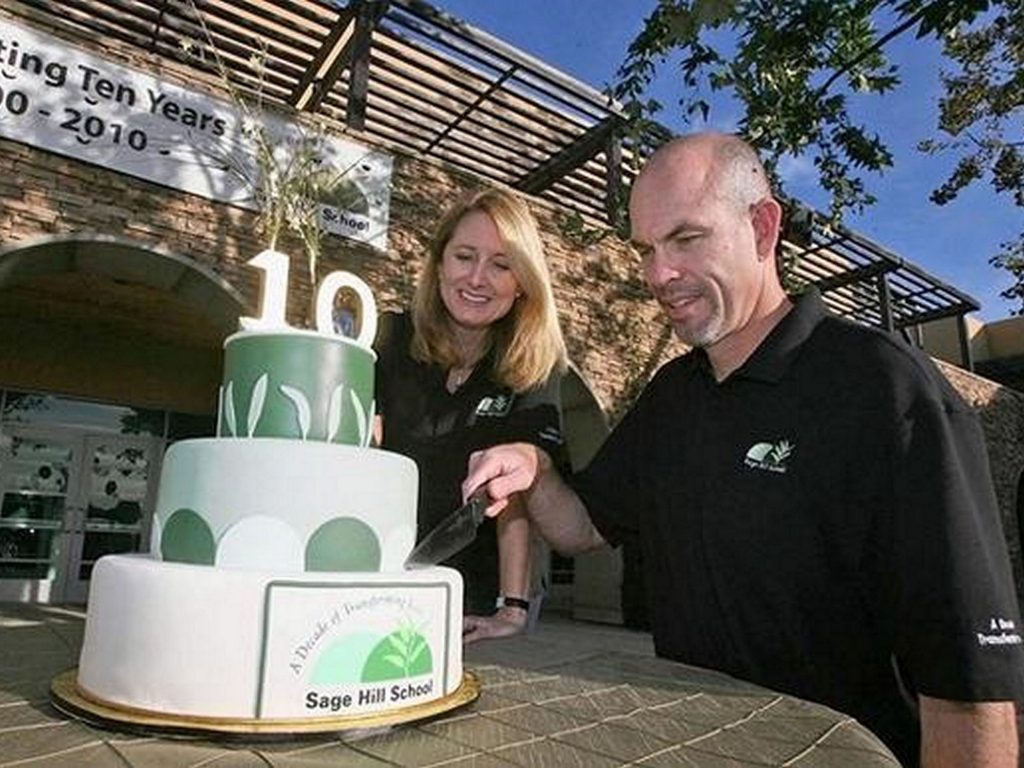
— Photo courtesy Sage Hill School ©
The first new building since the campus’ construction was the Studio at Sage Hill, a 30,000-square-foot arts center built in 2009. Prior to the Studio, arts performances would be held in the library, auditoriums at other schools, or tents set up outside.
Sage’s first decade was a time of tremendous growth, with enrollment increasing to well over 400 students by 2010.
The school community experienced numerous “firsts” including its first accreditation from the California Association of Independent Schools in January 2003, achievements in arts, athletics and service, the creation of an honor code, and the start of new traditions such as English Portfolio Night, pep rally, and use of the school gong. The first new campus building, the Studio at Sage Hill, opened in 2009.
Sage Hill School’s second decade saw the completion of the school’s master plan with the addition of facilities for science, tennis and swimming.
“Those were things we dreamt of way back in the early years,” McNeill said. “The campus was complete after that… The original footprint, the master plan, was done.”
The school also expanded programming with the introduction of the Spring at Sage year-end seminar and travel program. The inaugural Spring at Sage included poetic surfing, SCUBA, entrepreneurship, exploring the paranormal, and trips to China and Costa Rica.
Currently, the school has nearly 550 students. The objective now is to hold the line, Merz said.
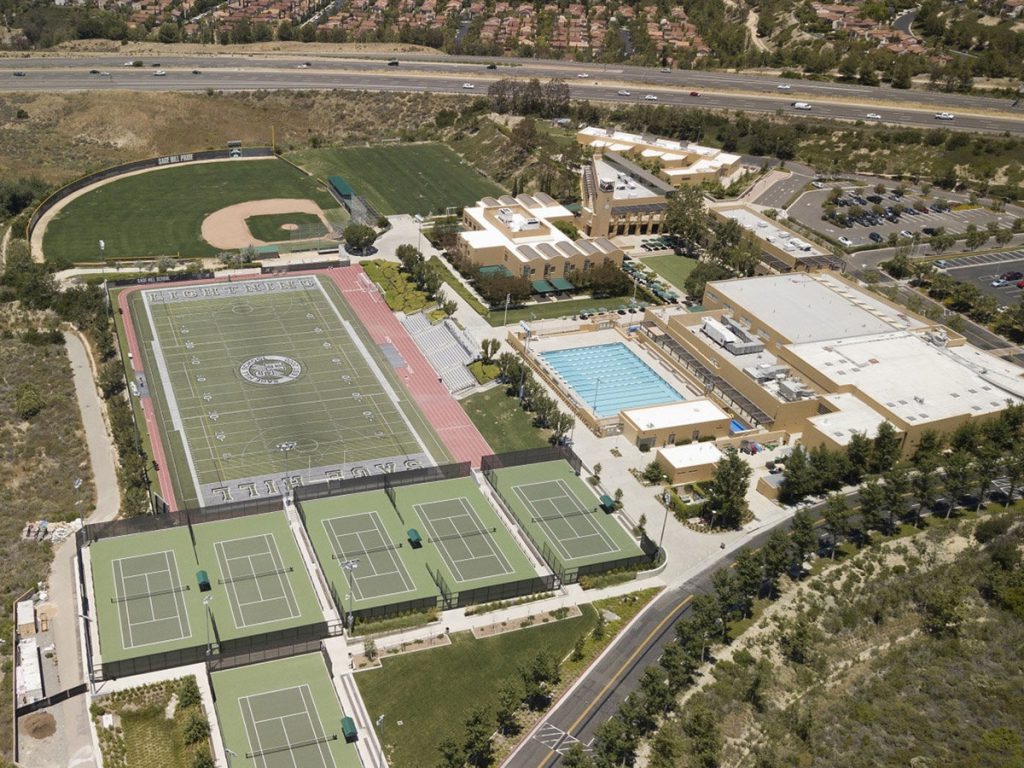
— Photo courtesy Sage Hill School ©
Recently, Sage was named the number one best private high school in Orange County for 2020 by Niche.com, a ranking and review website for K-12 schools, colleges, cities, neighborhoods and companies across the U.S.
“I have a great sense of pride,” in Sage, McNeill said. “We owe a lot of it to the people who were bold enough to have the courage to say, ‘We’re going to build this thing.’…I look back at the founders in gratitude.”
Sage found it’s footing over the past 20 years and established itself as the top independent high school in Orange County, Merz said.
“I have enjoyed watching the school progress in its confidence,” Merz said.
She said the next step is asking “Now what?”
“How do we continue to think differently in a way that we can improve on what we do?” Merz asked. “If you keep doing it the same way, you become flat and you’re no longer relevant, in my opinion.”
Programming needs to remain nimble, flexible, and responsive, she commented.
“I’m confident we’re doing that,” Merz concluded.
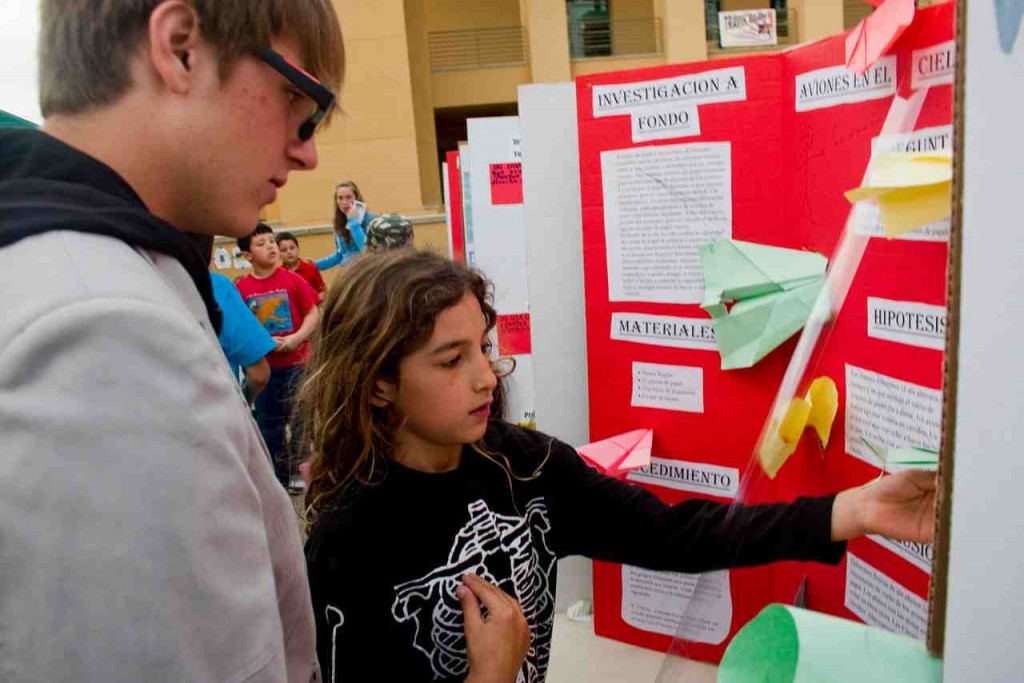
— Photo by Sara Hall
Part of the goal moving forward is to build the endowment, Merz emphasized. Growing their resources will allow them to provide more students access to Sage Hill, as they can increase the amount of funds they give for financial aid, she explained.
“It’s a priority for the school (now), but it’s also something that will live beyond all of us here,” Merz said about growing the endowment. “It will impact the students 10, 15, 20 years from now…So students that follow will have the same opportunities and the same level of programs and engagement with the world.”
The endowment has given the school some security, but it needs to grow more, McNeill agreed.
It will ensure that Sage can bring in a broader scope of students from different backgrounds, hire and retain the best faculty and staff in the nation, and offer the best courses and programs possible, McNeill explained.
They are also looking to make sure they are remaining innovative in the programs that they offer and developing programs that give students unique opportunities, like Spring at Sage.
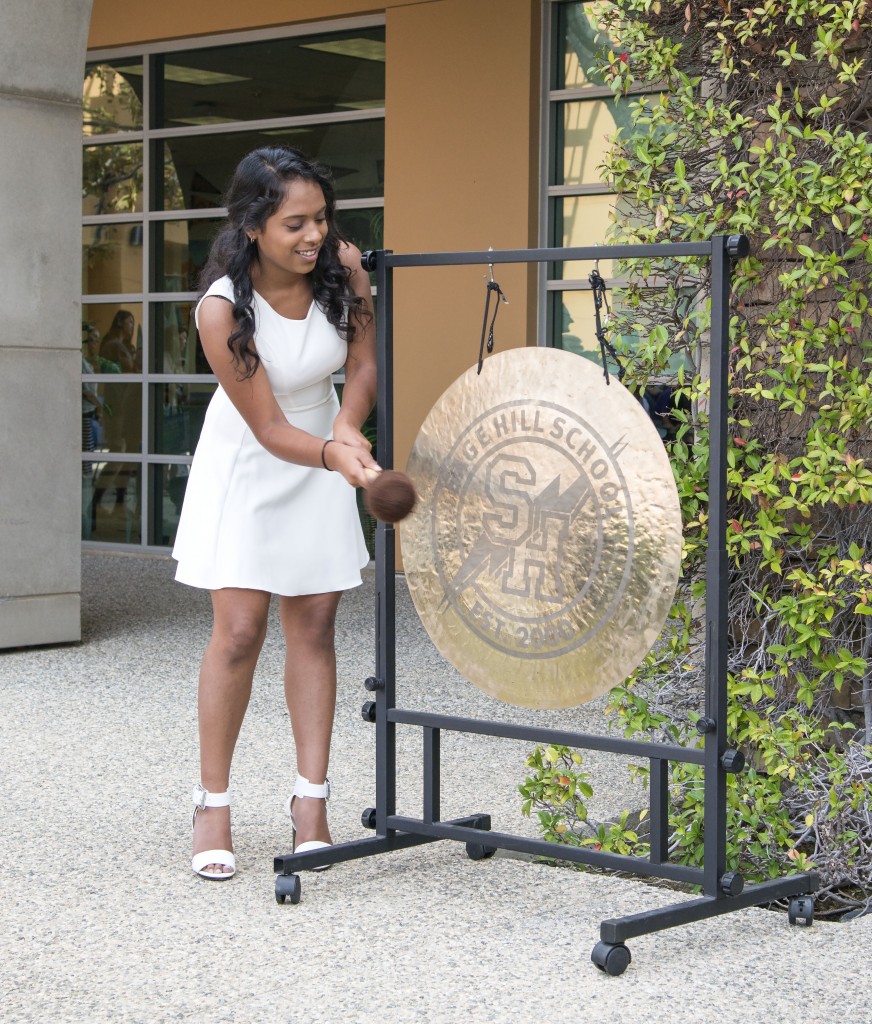
— Photo by Charles Weinberg ©
The Sage Center is the hub for innovative and experiential teaching and learning within and beyond the Sage Hill campus, McNeill noted. Weaving together service work, advising, hands on experiences, and tying that into the classroom.
“Where it’s headed is exciting,” McNeill said. “It looks really promising.”
The school overall is very forward-thinking, Connolly commented. She hopes everyone involved can take a moment, enjoy what Sage Hill School has become and “give ourselves a pat on the back,” she said.
Embrace it and celebrate it before moving on to the next step, Connolly said.
“We’re in a great place,” Merz said. “We’re healthy, as an organization, but also able to lift our heads up and look to the future and say, “What are we going to do next?’ because we’re not going anywhere.”
For more information, visit sagehillschool.org/about/20th-anniversary

— Photo by Sara Hall ©




